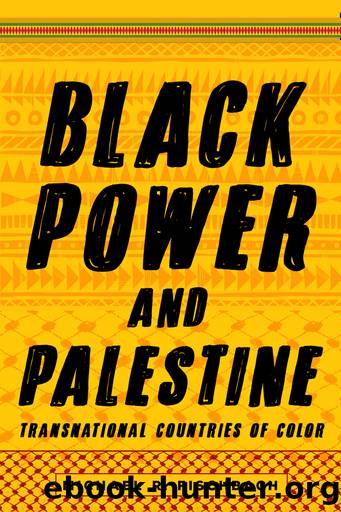Black Power and Palestine by Fischbach Michael R

Author:Fischbach, Michael R. [Fischbach, Michael R.]
Language: eng
Format: epub
Publisher: Stanford University Press
Published: 2018-06-14T16:00:00+00:00
CHAPTER 8
RED, WHITE, AND BLACK
Communists, Guerrillas, and the Black Mainstream
ON JULY 28, 1970, the director of the Washington office of the American Committee on Africa (ACOA), Charles Hightower, wrote an angry letter to some of those who had signed Bayard Rustin’s pro-Israeli advertisement in the New York Times expressing his “profound opposition and outrage” at what they had done.1 Hightower’s action triggered a strong backlash from Rustin and led to a small avalanche of intra-ACOA meetings and letters lasting several months. Hightower’s bitter opposition to Rustin and his establishment cohorts represented a challenge to the very sense of inside-the-system legitimacy that ACOA represented and brought up the same issue of white paternalism that SNCC had confronted several years earlier. Hightower found that he was not alone among his ACOA colleagues in his outrage—a feeling that led to some profound soul searching within ACOA about who really controlled the organization and what its purpose was. Who, then, was Charles Hightower, and why did his letters of pro-Palestinian pique set off such a chain reaction? And why was it that the question of Israel and the Palestinians set off the brouhaha within a mainstream organization focused on Africa?
CONTROVERSY WITHIN THE AMERICAN COMMITTEE ON AFRICA
The ACOA hired thirty-six-year-old Charles Hightower in 1970 to head its Washington, DC, office. The committee had been formed in 1953 to support anticolonial struggles in Africa. ACOA emerged from an earlier ad hoc group, Americans for South African Resistance, which had been formed by two ministers in New York to support the African National Congress call for a “Campaign of Defiance Against Unjust Laws” in South Africa. From its headquarters in New York, ACOA tried to reach out to a broad coalition of labor, religious, and civil rights groups, as well as politicians and other constituencies, to draw attention to the black anticolonial and antiracist struggles emerging on the African continent. In 1967 ACOA established a branch office in Washington to monitor Congress and bring attention to African struggles in the seat of American power.
On July 28, 1970, one month to the day after Rustin’s advertisement appeared, Hightower wrote his angry letter to some of the blacks who had signed it. He wrote the letter on ACOA stationery and signed it as the Washington director of ACOA. The letter expressed Hightower’s “profound opposition and outrage” at each signatory for having signed a statement “of support for Israeli aggression against the Arab peoples of the Middle East,” as well as for the fact that “you have incorrectly attempted to justify your action by relating Israel to the world-wide movement for social justice.” Given that ACOA was created out of support for blacks suffering from official racism in South Africa, Hightower went on to write about Israel’s relationship with the apartheid regime and the degree to which both oppressed people of color: “Apparently, you are ignorant of the fact that Israel is supported by South Africa, that each of these states keep about 5,000 political prisoners in detention, that in
Download
This site does not store any files on its server. We only index and link to content provided by other sites. Please contact the content providers to delete copyright contents if any and email us, we'll remove relevant links or contents immediately.
The Secret History by Donna Tartt(19017)
The Social Justice Warrior Handbook by Lisa De Pasquale(12182)
Thirteen Reasons Why by Jay Asher(8880)
This Is How You Lose Her by Junot Diaz(6868)
Weapons of Math Destruction by Cathy O'Neil(6257)
Zero to One by Peter Thiel(5778)
Beartown by Fredrik Backman(5726)
The Myth of the Strong Leader by Archie Brown(5490)
The Fire Next Time by James Baldwin(5421)
How Democracies Die by Steven Levitsky & Daniel Ziblatt(5207)
Promise Me, Dad by Joe Biden(5138)
Stone's Rules by Roger Stone(5073)
A Higher Loyalty: Truth, Lies, and Leadership by James Comey(4944)
100 Deadly Skills by Clint Emerson(4909)
Rise and Kill First by Ronen Bergman(4766)
Secrecy World by Jake Bernstein(4735)
The David Icke Guide to the Global Conspiracy (and how to end it) by David Icke(4694)
The Farm by Tom Rob Smith(4498)
The Doomsday Machine by Daniel Ellsberg(4477)
